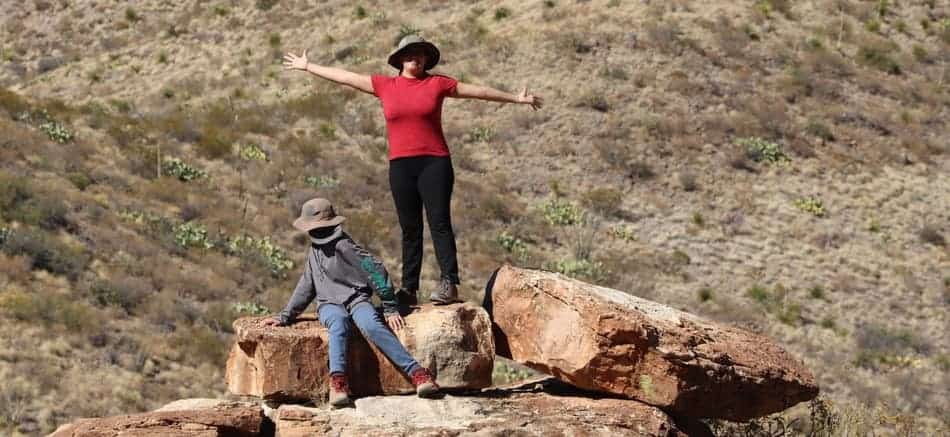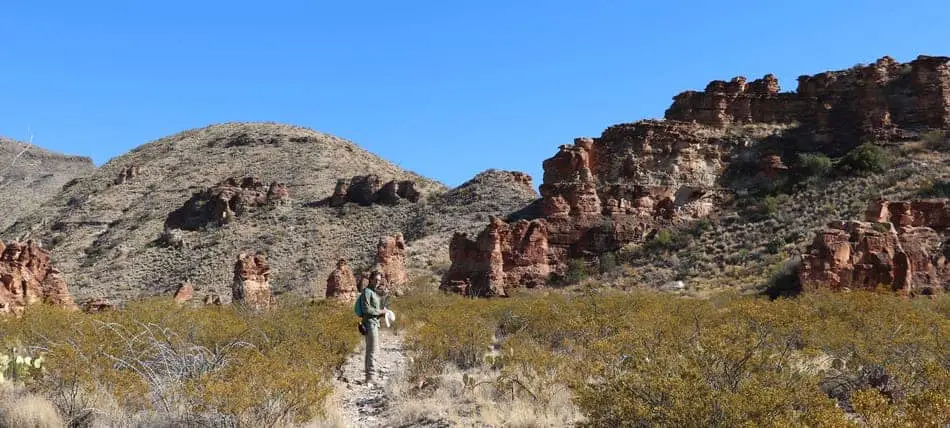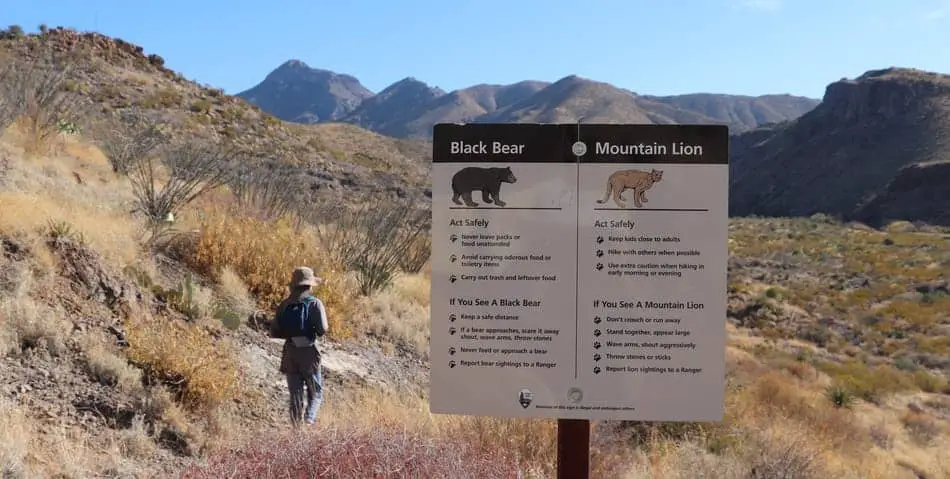
When you are hiking, you will lose more water than you normally would while sitting at home. Even if you are not sweating, you could be losing a pound or more of water per hour.
Staying hydrated might seem simple, but there is much to consider. This post covers everything that you need to know about staying hydrated while hiking.
How Does Your Body Lose Water While Hiking?
Hiking is a physical activity that involves walking along a path in the great outdoors. It can be very strenuous climbing to the top of a mountain or quite easy strolling along a dry creek bed in the desert. In every conceivable scenario, your body will always be losing water while hiking.
But, just how does your body lose water while hiking?
Your body will lose water while hiking through three mechanisms. You will lose water through perspiration. You will lose water by respiration. Lastly, you will lose water by urinating and defecating.
Perspiration
Most hikers believe they if they are not sweating, they are not losing much water. This could not be further from the truth. Even at rest while binge-watching Netflix, you are losing water. Perspiration is an important factor for water loss while hiking, but it is not the whole story.
When you are hiking, your body is producing heat. The large muscle groups in your lower body that propel you along generate lots of energy, and heat is a byproduct of this process.
As your body heats up, it may begin to sweat to cool itself off. Sweat is mostly water and contains trace amounts of other things found in your body, such as minerals and proteins.
Respiration
While you are hiking, you will be breathing more heavily than you normally would. Oxygen is a key molecule in the process that produces chemical energy to fuel your muscles. Without oxygen, your body cannot produce this energy.
Physical activity such as hiking requires lots of energy, and so you will be breathing more to keep up with the demand for more oxygen. This process of drawing in air and expelling it again from your lungs means losing water through your respiratory tract.
Your lungs, trachea, mouth, and nose are all moist, and so as you breathe, this flow of air tends to dehydrate you from the inside out. The harder you breathe, your body uses more water to keep those passageways hydrated and moist.
Down the Toilet
The other way your body loses water while hiking is whenever you go #1 or #2. A typical human bladder can hold about 2 cups of urine before the urge to go will have most hikers running into the bushes to relieve themselves. If you stay hydrated while hiking, you will be losing quite a bit of water through urine.

How Much Water Do You Need to Drink While Hiking?
How much water you need to drink while hiking depends upon several factors. The easy answer: enough water to avoid the problems associated with dehydration.
Each person is different, but a typical hiker under normal conditions should consume about one liter of water per hour while hiking. Factors such as fitness level, terrain, and weather will increase or reduce the amount of water a hiker should drink.
One liter of water per hour is equivalent to drinking two and a half cans of Coca-cola. I am certainly not advocating you drink Coke on a hike, but two and a half cans give you a better picture of how much water that is per hour.
The real question here is NOT how much water you need to drink while hiking, but how much water you lose while hiking. If you know the answer to that question, then you know how much water to drink.
You can calculate your personal water loss rate by weighing yourself before and after a training hike or brisk walk over a known distance and time. For a quick guide on how to do this, check out my post here with an easy four-step process.
Effective Ways to Stay Hydrated While Hiking
During a hike, you are typically going to be distracted. The smells, the sights, the sounds will overload your sensory system, and you may lose track of time, that pain in your foot, and the onset of dehydration.
During a hike, it is important to have a plan for staying hydrated. Carrying enough water is only part of the battle. Remembering to drink it is also critical. To avoid carrying around a gallon of water all day, follow these simple tips.
- Drink enough water for a couple of hours before you hike so that your pee is a clear yellow color. This will reduce the amount of water you need to carry with you.
- Drink water continuously throughout the hike so that when you finish, you aren’t carrying all of your water. I suggest drinking about a liter per hour under most conditions, but this will vary.
- Monitor your body and your state of health. Have you had the urge to urinate during the hike? Are you faint or light-headed? Are you sweating profusely? Is it hot, and you stopped sweating? Based on your assessment, you may need to take a break and drink more water.

Environmental Factors that Impact Hydration on a Hike
Please take my advice and calculate your personal water loss rate on a training hike. Mine is about 2.5 cups of water per hour of hiking under normal conditions. What happens, though, when it gets hotter or colder? How will temperature, altitude, or humidity change how much water you lose while hiking?
Generally, you will lose more water while hiking under extreme conditions. Extreme cold or extreme heat can both rob your body of moisture and bring on the ill effects of dehydration. High altitudes can also increase your body’s demand for water while hiking.
Read on as I explain how weather and altitude can affect your hydration while hiking.
Hydration and Altitude
High-altitude hiking is not for the weak. There is a reason why trees don’t live at high elevations – there is not enough of what they need to survive. When you start hiking above 9,000 or 10,000 feet, you enter a zone that puts more pressure on your body.
While hiking up passes at 17,000+ feet in Peru, I was struggling to hike and breathe. Living at sea level in South Texas, I am accustomed to air containing about 20% oxygen. At 17,000+ feet, the amount of oxygen in the air was nearly cut in half.
I was breathing much harder to provide the necessary amount of oxygen my body needed to produce energy.
When you are hiking at a high elevation, you will be losing water primarily through respiration. You will be breathing more often, drying out your airways. The air also tends to be much drier.
These two factors mean that you will need to drink much more water than you normally would on an average hike, even if you are not sweating.
Hydration and Cold Weather
It may seem counter-intuitive that you would lose more water while hiking in cold weather. In extreme cold, the air holds very little moisture. Below freezing, the amount of water in the air is reduced to nearly zero.
Trudging through the woods in the extreme cold will dehydrate you quickly because of the air’s lack of moisture. Each breath you take is dehydrating your body from the inside out.
While hiking in frigid weather, you will need to drink more water than you realize to stay hydrated even if you do not sweat.
Hydration and Hot Weather
No surprises here. If you plan to hike in hot weather, be prepared to drink more than a liter of water per hour to stay properly hydrated. I wrote an entire blog post about hiking in hot weather. I live in South Texas. Check out the post.
Your body will be sweating profusely to stay cool while hiking in hot weather. You need to conserve as much of the cooling effect of sweat as you can. You should wear loose-fitting, light-colored clothes that cover your entire body.

How to Reduce the Amount of Water You Lose While Hiking
You can do simple things to reduce the amount of water your body will lose while hiking. These are good techniques to remember when hiking in hot, arid environments, but they can be useful on any hike.
Breathe Through Your Nose
Researchers at the Sahlgrenska University Hospital in Göteborg, Sweden, conducted a study published in 2006. The researchers found that subjects that breathed through their noses lost 42% less water than subjects who breathed through their mouths.
If you are like me, you tend to breathe through your mouth while hiking. Try to breathe through your nose, and you will significantly reduce the amount of water you lose through respiration.
Breathing through your nose while hiking might take some time to get used to, but it is very effective. I hiked in the Chihuahuan desert last month and found this technique very effective at conserving water in my body.
Wear Loose Clothing That Covers Your Body
If you are hiking in hot weather, do not wear flip-flops, shorts, and a sleeveless shirt. Cover your body as much as you can with light-colored clothing.
Long sleeve shirts and full pants will trap the sweat your body is producing so that it does not evaporate as fast into the environment. This clothing also protects your skin from adverse weather such as wind or sun that can suck moisture from your body.

